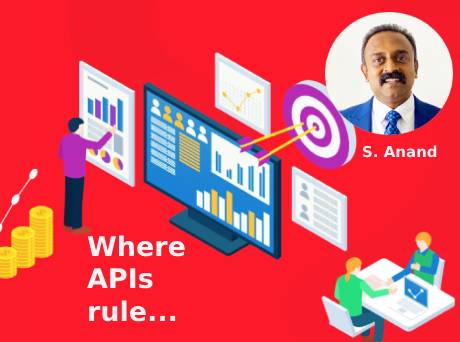
By S. Anand, CEO and Co-Founder, PaySprint*
March 21 2021: A decade ago, RBI introduced NEFT and RTGS, followed by NPCI introducing IMPS, and this was a start of digital or online banking and a paradigm shift in the way services were offered to the end consumer. The Next stage of evolution was from an internet banking to API led Banking.
The dawn of API in banking has resulted in significant changes concerning how financial operations are carried out. Although APIs have been widely used for over a decade, their use has recently become prevalent in financial services.
API (Application Programming Interface) traditionally pertains to the tech interface between software programs. This interfacing ability facilitates a third-party application like PaySprint, to synchronise and connect to a bank’s tools and services.
API banking refers to a set of protocols that makes a bank’s services available to other third-party companies via APIs. This helps both banks and third-party companies augment their complementary specialties and offerings more than they can provide to their customers by themselves.
How API banking works
Over the last few years, APIs have become particularly significant to banks and fintech companies. APIs provide better means to share data, integrate with systems, and personalise services, making financial services quick and efficient. The same applies to banking.
Banks grant secured access to their financial services to third-party platforms, helping companies build products around banking services. Essentially, the core of the banking operation remains the same, but the experience is heightened.
Let’s consider an example where the bank is ICICI, and the third-party company is PaySprint:
- ICICI bank allows PaySprint to access its banking services, making transfers, balance query, and other functions available
- Next, the integration of ICICI’s APIs with PaySprint products takes place
- Finally, PaySprint makes API calls and fetches the necessary services from ICICI bank to further execute banking operations
Types of APIs
Private API: This API is accessible only within the financial institution and is therefore used to improve internal processes, such as boosting operational efficiency.
Partner API: A more open API that can be accessed by the bank’s preferred third-party partners like PaySprint. As such, partner APIs can facilitate greater expansion through new channels than a private API. Such partners could include clearinghouses, brokerages and custodian banks, and they can provide services to their customers using the bank’s platform.
Open/public APIs: Not as commonly used at this stage, this API involves making business data available to third parties. Banks can deploy such APIs to generate additional business and grow their customer bases. For example, the bank could enable an API for a loan-comparison app, which would allow it potentially to acquire new business from customers shopping for new loans.
Benefits of API banking
With API banking, innovators have more flexibility to provide the best features and services to streamline financial services, thereby creating a surge of competition and innovate fintech’s products.
The most important fallout of API Banking is the data analytics which lies at the heart of the banking API revolution. Banks can now collect substantial quantities of data relating to customer behaviour, which should, in turn, enable them to create more tailored product & services and also specific marketing initiatives. For instance, banks can gain a more realistic picture of customers’ financial situations, which in turn can create and offer the right lending product. Similar is the case with payments, collections, ecommerce, gaming and many more use cases
Banks will continue to be the custodian of the customer and various products and services without comprising security and compliance whereas Fintech’s will be able to usher greater innovation, better technology creating a great customer interface leading to larger consumer adoption and Delight.
Today Banks are convinced that in order to grow and extend the Banking solutions beyond their own banking Channels and technology and in order to achieve larger adoption of their financial services they need strong partnership with Fintech’s thru API Banking, so thereby API Banking is truly creating a Revolution in Banking.
PaySprint, is a Fintech venture focussed on Next Gen Neo Banking Solutions, offering a Unified Open API Platform